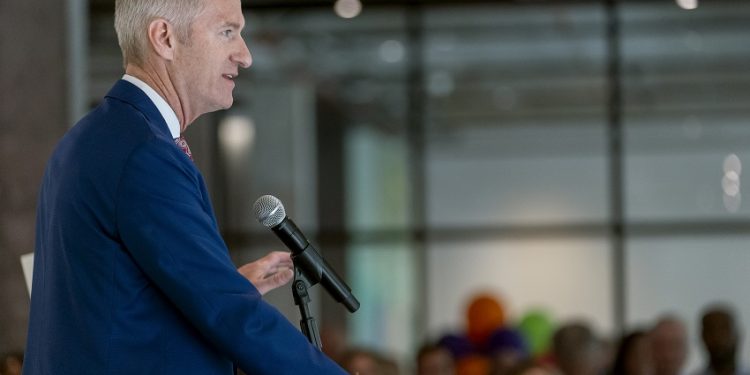Portland, OR – Portland’s incoming mayor, Keith Wilson, is facing resistance from city employees after unveiling a proposal to require them to work from the office at least four days a week. During a virtual town hall meeting with approximately 1,400 city staff members on Thursday, Wilson shared his plan to shift away from the current hybrid work model, which mandates employees to work in-person for half of their workweek.
The announcement immediately triggered a flood of concerns in the meeting’s chat box, with employees citing difficulties related to childcare, rising parking costs, the environmental impact of commuting, and the loss of flexibility. Several staff members voiced their dissatisfaction, arguing that remote work has proven to be a productive and efficient way for many employees to contribute to the city’s mission.
One employee expressed the frustration felt by many, writing in the chat, “There is a huge talent pool made up of workers who are more productive, more efficient, and better able to contribute to the City’s mission when they can do that work remotely, at least some of the time. It is critical that decision makers recognize that remote work opportunities are essential for equity.”
The current hybrid work policy was introduced in the aftermath of the COVID-19 pandemic when many city offices closed their doors. Today, around 40% of Portland’s 7,000 employees are working under this hybrid arrangement. Wilson’s push for stricter in-office requirements aims to support the downtown economy and strengthen city departments. However, his language regarding a “return to work” requirement has been seen as dismissive by many employees. One staff member even wrote in the chat, “That indicates, by working remotely, we aren’t necessarily working… which is insulting and infuriating.”
During a press conference later that day, Wilson declined to provide details on his proposal, stating, “We’re not ready yet to talk about it.” The mayor-elect, who will officially take office on January 1, has long been vocal about his desire to bring employees back to the office. His stance, however, has alienated some key labor groups that have withheld endorsements due to his position on in-office work.
Wilson has also pledged to work long hours once he assumes office, including seven days a week, but has clarified that he does not expect others to follow his demanding schedule. In a recent interview, he emphasized, “I’m very appreciative when people will come in on Saturday, but I don’t expect people to try and meet my level. But that does drive others to perform better.”
Before making any changes to workplace requirements, Wilson would need to negotiate contract changes with each of the city’s 14 public labor unions. Unions are already pushing back against the proposed in-office mandate. Paul Cone, president of PROTEC 17, which represents employees in multiple city bureaus, expressed concern that the policy could lead to a “brain drain” as staff members leave for more flexible work options.
Cone argued, “We have proven that we can be a flexible, efficient workforce while working hybrid. This mandate, that’s not flexibility. I really don’t think this is the hill he should die on.”
The ongoing tensions between city leadership and labor unions extend beyond work arrangements. Earlier this week, the Portland City Council authorized city lawyers to file an unfair labor complaint against the American Federation of State, County and Municipal Employees (AFSCME) Local 189, accusing the union of violating its contract during a picket this fall.
With Wilson’s official start date approaching, the debate over the future of hybrid and in-office work in Portland is likely to intensify as both employees and unions prepare for the next phase of negotiations.














